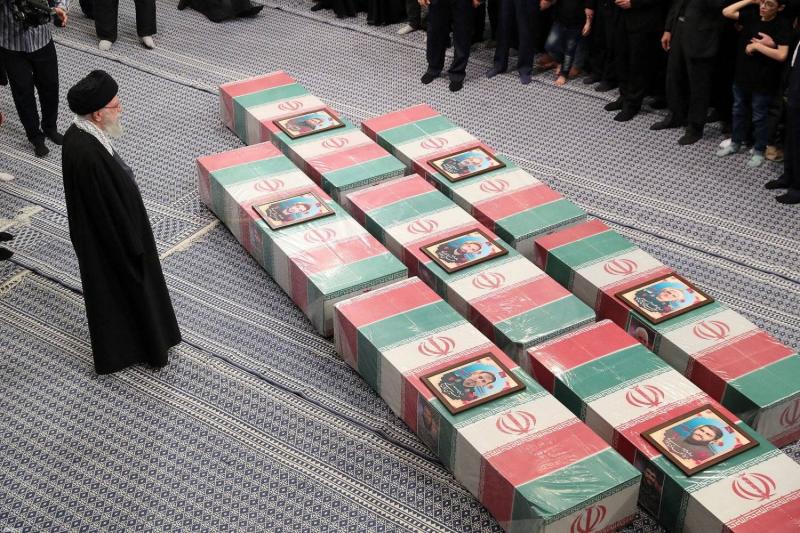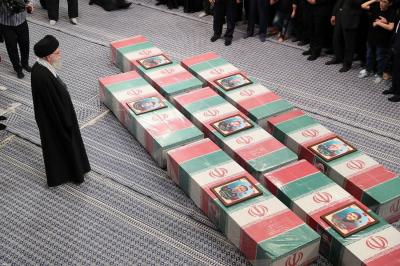Tehran must deliver a significant response, but within limits that do not lead to a large-scale war with Tel Aviv or a confrontation with Washington.
There is no shortage of Iranian figures calling for a major response, even going so far as to suggest "wiping Israel off the geopolitical map of the world," according to the editor-in-chief of the "Kayhan" newspaper, close to the Supreme Leader. In response to a question about the state of the Habsburg rulers during the final days of the Austro-Hungarian Empire, one replied, "Hopeless but not dangerous," and today we are in a dangerous game that is still, for now, not catastrophic.
Iran is fighting Israel and America through its proxies in Iraq, Syria, Lebanon, and Yemen, while Israel targets Iranian proxies, personalities, and sites outside its borders. The U.S. conducts airstrikes on these proxies and selects key Iranian figures for assassination, as was the case with Quds Force Commander General Qassem Soleimani on the road to Baghdad Airport.
This time, Israel has breached diplomatic norms by bombing the Iranian consulate in Damascus, resulting in the deaths of seven officials from the Quds Force, including General Mohammad Reza Zahedi, the commander of the force in Syria and Lebanon, and his deputy, General Mohammad Hadi Haj Rahimi. Everyone is perplexed; Israel is on high alert and confused about where Iran will retaliate after Supreme Leader Ali Khamenei spoke of an impending "slap." The U.S. is also uncertain, as its forces are widely spread in the region, making a response possible anywhere. Iran itself is uncertain about the type and scale of response—should it be through proxies or directly? Inside Israel or outside, targeting embassies?
Many figures have called for a significant response, even suggesting "wiping Israel off the geopolitical map of the world," as stated by the editor-in-chief of "Kayhan." The struggle is unequal for the soul of Lebanon, with figures inside Iran, including Revolutionary Guard Commander General Hossein Salami, stating that "the Zionist entity currently breathes in the American intensive care unit, and when the life support is removed, it will collapse, and that is very near." Deputies and other officials have spoken about the opportunity to finish off Israel, comparing it to a "spider's web." Notable figures from abroad, such as Hezbollah's Secretary-General Hassan Nasrallah, have claimed that "the foolishness committed by Netanyahu at the Iranian consulate will open a door for relief and resolve the battle."
The pressing question remains: has the era of proxy warfare ended? Or is the prevailing view among the Supreme Leader's circle still one of "strategic patience," concerning Israel's plans to drag Iran into a full-scale war that America would enter, allowing it some ease?
So far, it is certain that neither Iran nor America desires a large-scale war. The Iranian clerics perceive no benefit in escalating hostilities, believing that limited proxy clashes suffice for their role as a major regional power. President Joe Biden, facing a challenging presidential election in the fall, does not want a war with Iran, which he knows would destroy his electoral chances unless he can reach an agreement or some understanding with Tehran.
The precedents are clear: after the assassination of Qassem Soleimani, who was much more significant than those assassinated at the consulate, Iran decided to respond to American forces in Iraq by targeting the "Ayn al-Assad" base hosting American troops, but it informed both the Iraqi Prime Minister and the Americans about the time and place of the assault, resulting in material damage that did not escalate tensions with Washington.
Calls from "Qassam Brigades" military leader Mohammed Deif to march on Palestine went unanswered. Everyone remembers what "Reuters" reported about Iranian officials and Palestinian factions, with Khamenei telling his visitor, Hamas political bureau chief Ismail Haniyeh, that the movement did not "inform Iran about the attack on October 7, 2023, against Israel, and Iran will not enter the war on its behalf." It was also stated by the Supreme Leader that speculation about the Iranian republic's involvement in the Hamas attack is merely "rumors from the supporters of the Zionist entity and a miscalculation."
Furthermore, the statement from the "Revolutionary Forces Alliance," which recently declared that the slain General Mohammad Reza Zahedi was the "planner and main executor" of the Al-Aqsa Flood operation, contradicts the official Iranian stance and may merely be an exaggerated claim. There must be an impactful Iranian response; however, it should remain within limits that do not lead to a large war with Israel and confrontation with America—the game is long.




